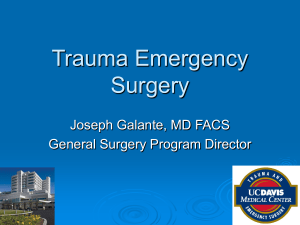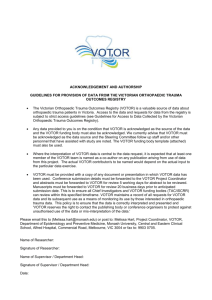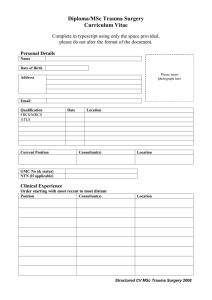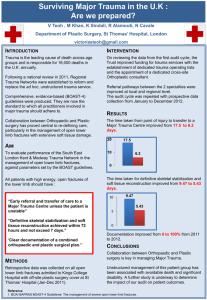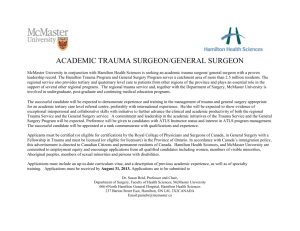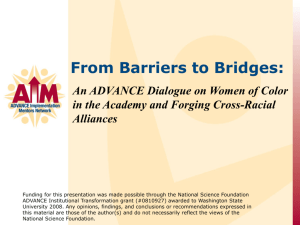woc newsletter 174 2015-07 ii
advertisement
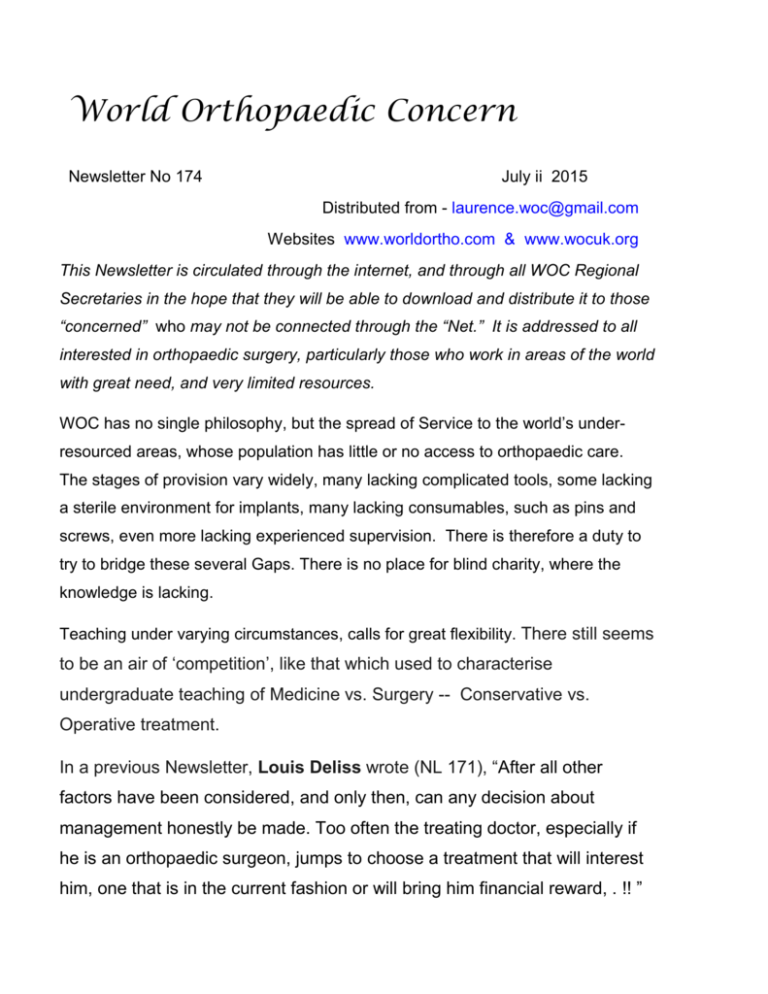
World Orthopaedic Concern Newsletter No 174 July ii 2015 Distributed from - laurence.woc@gmail.com Websites www.worldortho.com & www.wocuk.org This Newsletter is circulated through the internet, and through all WOC Regional Secretaries in the hope that they will be able to download and distribute it to those “concerned” who may not be connected through the “Net.” It is addressed to all interested in orthopaedic surgery, particularly those who work in areas of the world with great need, and very limited resources. WOC has no single philosophy, but the spread of Service to the world’s underresourced areas, whose population has little or no access to orthopaedic care. The stages of provision vary widely, many lacking complicated tools, some lacking a sterile environment for implants, many lacking consumables, such as pins and screws, even more lacking experienced supervision. There is therefore a duty to try to bridge these several Gaps. There is no place for blind charity, where the knowledge is lacking. Teaching under varying circumstances, calls for great flexibility. There still seems to be an air of ‘competition’, like that which used to characterise undergraduate teaching of Medicine vs. Surgery -- Conservative vs. Operative treatment. In a previous Newsletter, Louis Deliss wrote (NL 171), “After all other factors have been considered, and only then, can any decision about management honestly be made. Too often the treating doctor, especially if he is an orthopaedic surgeon, jumps to choose a treatment that will interest him, one that is in the current fashion or will bring him financial reward, . !! ” “We must stop discussing the simplistic choice between operative and nonoperative treatment. Even when both can be appropriate, and all the conditions are in place there remains “choice”. These points must all be honestly assessed? The current debate implies that operative treatment is always superior to non-operative, it is not. Nor is a conservative option always the easiest. Each patient deserves that the treatment method proposed be fully assessed for appropriateness.” The duty of the visiting teacher/trainer might require teaching a different style than that with which he or she is familiar, adjusting to unknown circumstances. Ideally the visitor will be well known to the host and be invited for a specific function. The visitor with a commercial link may not be appropriate. Unpredictability calls for ingenuity; nowhere is this more essential than in the case of Trauma. A very great deal of necessary reconstruction stems from long-neglected fractures or dislocations. But the heat of Trauma presents even greater difficulties. -o0oLife and death decisions are often made in the first few minutes of a sudden, serious accident. But the actual diagnosis of death is the most responsible decision, and there is never anyone at the scene with the knowledge or experience to make that decision with confidence. Death must never be assumed without some attempt at resuscitation. When an accident happens (and by definition it is unexpected) the person nearest to the victim has the best opportunity of saving his life; and he or she will never have been in this position before. The Big Impact of Major Trauma. On July 22nd, the President of the R.C.S., Clare Marx, established an initial discussion seminar, held in the Council chamber, to introduce the work of the Education Faculty of the College. A small invited group attended (including two from WOC) familiar with the complexity of Major Trauma and the process of training, where no formal scheme exists. Raw statistics paint a bleak picture of inadequate preparation, for the sort of catastrophe which, by definition, comes “out of the blue”. Surgeons cannot, like Life Savers on Bondi beach, sit idly waiting for an emergency. Nor can every injury be sent to a centre of “absolute excellence” in Trauma. Limb injuries will always be at the core of practice for every orthopaedic surgeon. Major Trauma is more the business of intensive care physiologists, but with specialists close at hand, to attend to the head and neck and chest, abdomen and pelvis, all working simultaneously, not in sequence. The stages of management of the severely injured can be divided according to “Time” – taken to get the casualty to hospital (a s a p), to make the detailed multiple diagnosis, sought on the basis of urgency, and requiring many “second looks”. This has been established through the Acute Trauma Life Support protocol, based on the “Golden Hour” after injury. ATLS requires attention to the vital systems, respiration and circulation, followed by the second phases of renal, neurological and skeletal function. These skills, like any other, depend upon constant use, in order to maintain efficiency and excellence. Major Trauma units are essential for the concentration of staff and equipment. They must not be blocked by the minor and uncomplicated. In short the efficiency of the system depends on expertise at every stage, from first aid to intensive care. From profound experience Surgeon Commander Mansoor Khan, described his training for his present post as designated “Trauma Consultant Surgeon,” at St Mary’s Hospital, Paddington. This is one of four such units in London. He drew the distinction between “ordinary general surgery”, and his responsible post as “Expert in every department” ! The four faculty members spoke about their own training and research, covering aspects from skin cover to the immune system. Mansoor speaks with passion about his chosen practice, copying his role model Mr David Nott. Mansoor stated that Nott has greater experience, probably, than any one else in the world of Trauma. This he acquired by making himself instantly available, even actively seeking catastrophes, through the Red Cross, MSF &c, far beyond the boundaries of Orthopaedics! Major James Barry showed his own experience in Iraq where six trauma teams staffed six complete surgical “tables” in a huge hanger-like space in Camp Bastion. The case is well made for Military Organisation. But the question remains -- such high pressure is intermittent; and an idle, peacetime army can sag, without dramatic activity. Dr Hew Torrence, a research fellow of the College, drew attention to the unseen impact on the immune system and the propensity for infection, which, not infrequently, spoils a triumphant recovery. His title – “When the Bleeding Stops. . .” - covered the sequence of steps toward reconstruction. Dr Seema Valamanchilli gave a clear portrayal of her experience as one “in training” for this non-specialist speciality. From these few succinct presentations the difficulty emerges, of providing supervised instruction and at the same time, a substantial work load. Also it underlines the importance of concentrating the most widely injured casualties into dedicated units. Questions were raised about the structure of tuition, relevant training and the “road-side” immediate involvement of the totally uninformed and inexperienced bystander – the immediate saver of life! Pre-hospital care is often heroic; its origin can only be in elementary education and community attitudes, conveyed from ambulance men, first-aiders, community conscious personnel and sportsclub participants. In short the character and identity of a community, lies deep in Samaritan neighbourliness. What is natural for every parent, should be part of every citizen’s schooling. Further questions related to the long term reconstruction (surely orthopaedic) to restore the Casualty’s work potential. This is far removed from Trauma, but very much the business of our specialty. The College of Surgeons, is to be congratulated in taking this lead in the field of Traumatology, while acknowledging the fact that “in Service Training” has not (and perhaps can not) be neatly structured. In the search for the case-load experience, the Trainee must be both immediately available, be able to travel at once and to have instructional supervision. Indeed a very tall order; with a nod towards the College’s Educational Course on Surgery in “Austere Environments”. Let it not be forgotten, that the dangerously sick casualty has need for a broader experience of surgery in general, than any special expertise. Indeed there is a hundred-fold more victims of accidents in the world, than have need an arthroscope. The grossly overloaded hospitals of the world’s LMICs are best able to provide experience, hardly to be found in the West.! The above report is a personal one, by no means comprehensive, nor commissioned. (Ed) -o0o- Unconnected Correspondence:- “It is an uncomfortable fact that the ‘Western Press’ pays more attention to ‘tragedies’ affecting western (British) people than others! What annoys me is that they report the ‘incident’ as though there ought to be immediate ‘western’ emergency medical services available at a moment’s notice’ everywhere – and are almost ‘critical’ because ‘our people’ were not treated with the same efficiency as the troops in Afghanistan! And they always concentrate on the ‘failings’ rather than the excellent work done by the ‘helpers’! Is there not a place for wider publicity (broadcast media please note) of the ‘gap’ between the medical services (particularly for trauma) in so many parts around the world – and the work WOC does in support.” (M. Morrison) It is a curious feature writing these notes, that as one ages, and ceases to take an active part in traumatology, one finds oneself reaching back towards the classic, basic and simple, but still the most dramatically rewarding. The technical problems of metal implants and tools, slip back towards truths and absolutes, rather than to invented perfection. Much along these lines will comprise the WOC session at the SICOT Annual Conference in Guangzhou (old Canton) in September 16-19th 2015, incl. Fuller program details in the next Newsletter. In the course of correspondence and conversation about the supply of basic sets of surgical instruments for fracture management, Laurence Wicks has identified the best prices and supply, from Tim Beacon, of Med-Aid international. <medaidint@aol.com> (M. L.)

